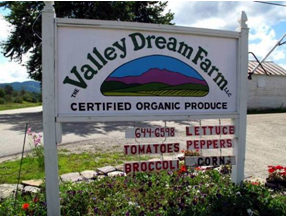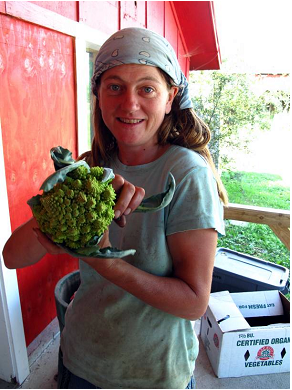

Keeping Local Farms Alive: Educating the Public about CSAs
An Organic Farmer’s Story
by Tamara Flohr
Ever since I had my first garden, I’ve thought the world would be a better place if everyone had a garden at one time or another.
I think the experience of sprouting and nurturing seeds and seedlings offers so many valuable life lessons in addition to the education it provides. The whole process inspires desirable feelings, including but not limited to: faith, wonder, patience, humility, self-reliance, and a deep satisfaction or form of serenity.
For people who don't or can't have their own garden, being part of a CSA allows them to glean this education and some of this goodness. I really do feel like the farm belongs to all the members, and members do have opportunities to participate and help out around the farm if they choose.
When coming to the farm each week, to pick up produce, members glimpse the evolution of the seasons. Our newsletters describe how the food members eat is produced. They can “know” it on a different level than the food they buy in a grocery store that imports produce from countries they may never visit (nor may be able to find on a map!)
The CSA members can see how hard we work. They appreciate and understand the real value of the food, as opposed to just taking for granted the unrealistic variety of perfect looking produce that sits (fortunately enough for us in this wealthy country) in the grocery store all year round.
They also learn how tenuous farming can be in years when there is a blight, or hail, or some other disaster, which brings up the education and humility factors I mentioned earlier.
Everyone has to eat and eating should always be so intimate and social.
Pick-up hours are a real party and I’m always blown away by how excited and appreciative members can be, they really get off on it; even in such a rural area as in northern Vermont, where I live. The way the members get excited about their fresh veggies continues to surprise me.
And let me say something about farmer gratification. Goodness knows we need more of it!
I can hardly begin to tell you how wonderful it is for farmers to get to know the people they’re feeding and to be able to give them the best possible produce at its optimum peak. It makes me feel happy about the work I’ve done to see the happy faces of our CSA members.
There’s also the variety of produce; members try new things they wouldn't otherwise purchase at a store. I can't tell you how many kohlrabi fiends I’ve created! They love it, so there’s the education and adventure again.
Members really learn so much; they start to really “get” it. In this age, when we're used to having anything at any time, I think it really helps people become more grounded and in tune with the seasons and their location.
CSAs keep farms viable, providing income in the spring when farmers are strapped for cash, and also allowing communities to retain open land. It really brings neighbors together.
People from all different walks of life who might not come together in any other situation become friends, sharing recipes and news.
They learn to recognize that the peas come in early Spring and then again in the Fall. They learn to savor the corn and tomatoes when they finally come in. Isn't it better to feast on to-die-for-tomatoes for a few months than to munch on flavorless ones all year long?
Vitamins in food start ticking away as soon as it is harvested so you need to be close to it. The same lettuce I grow is more vital for my neighbor than it is for some guy in D.C., a few days or weeks later.
 |
Learning to eat more in tune with the seasons is a big bonus; eating greens all through the hot months, and moving on to potatoes and squashes when the weather turns colder. It’s what your environment can provide and what your body needs.
Our bodies thrive where our foods thrive. We need to be creatures of our habitats to stay well.
Honey is a good example of this. Traditionally, raw honey has been used as a remedy for seasonal allergies but you'll want to eat you LOCAL honey with your LOCAL pollens to boost your LOCAL immune system.
So I keep coming back to local.
I’m an organic farmer and believe organic is important for the ultimate survival of our planet. But I also believe that whether or not your food is organic is not as important as how local it is.
For the future of people and our planet, food has to be local for both to be healthy.

Tamara Flohr lives in northern Vermont and manages the Valley Dream Farm in Cambridge, nestled in the foothills of Mount Mansfied.
When she’s not caring for her plants, she spends her time cross-country skiing, voraciously reading, and visiting her family on Cape Cod.